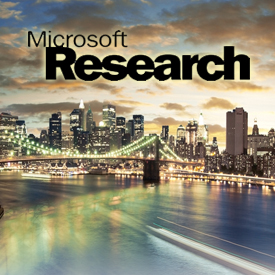Twenty-six researchers from Microsoft Research labs in Boston, China, India, Israel, New York City, Redmond, Silicon Valley, and the United Kingdom co-authored a remarkable seventeen of the eighty papers published in the 2014 ACM Conference on Economics and Computation (EC’14).
Moshe Babaioff served as General Chair for the conference and many other Microsoft Researchers served roles including (senior) PC members, workshop organizers, and tutorial speakers.
For research at the intersection of economics and computation, IMHO there’s no stronger “department” in the world than MSR.
Sébastien Lahaie and Jennifer Wortman Vaughan co-authored three papers each. Remarkably, Jenn accomplished that feat and gave birth!
The full list of authors are: Shipra Agrawal, Moshe Babaioff, Yoram Bachrach, Wei Chen, Sofia Ceppi, Nikhil R. Devanur, Fernando Diaz, Hu Fu, Rafael Frongillo, Daniel Goldstein, Nicole Immorlica, Ian Kash, Peter Key, Sébastien Lahaie, Tie-Yan Liu, Brendan Lucier, Yishay Mansour, Preston McAfee, Noam Nisan, David M. Pennock, Tao Qin, Justin Rao, Aleksandrs Slivkins, Siddharth Suri, Jennifer Wortman Vaughan, and Duncan Watts.
The full list of papers are:
Optimal Auctions for Correlated Bidders with Sampling
Hu Fu, Nima Haghpanah, Jason Hartline and Robert Kleinberg
Generalized Second Price Auction with Probabilistic Broad Match
Wei Chen, Di He, Tie-Yan Liu, Tao Qin, Yixin Tao and Liwei Wang
Optimising Tradeâ€offs Among Stakeholders in Ad Auctions
Yoram Bachrach, Sofia Ceppi, Ian Kash, Peter Key and David Kurokaw
Neutrality and Geometry of Mean Voting
Sébastien Lahaie and Nisarg Shah
Adaptive Contract Design for Crowdsourcing Markets: Bandit Algorithms for Repeated Principalâ€Agent Problems
Chien-Ju Ho, Aleksandrs Slivkins and Jennifer Wortman Vaughan
Removing Arbitrage from Wagering Mechanisms
Yiling Chen, Nikhil R. Devanur, David M. Pennock and Jennifer Wortman Vaughan
Information Aggregation in Exponential Family Markets
Jacob Abernethy, Sindhu Kutty, Sébastien Lahaie and Rahul Sami
A General Volume†Parameterized Market Making Framework
Jacob Abernethy, Rafael Frongillo, Xiaolong Li and Jennifer Wortman Vaughan
Reasoning about Optimal Stable Matchings under Partial Information
Baharak Rastegari, Anne Condon, Nicole Immorlica, Robert Irving and Kevin Leyton-Brown
The Wisdom of Smaller, Smarter Crowds
Daniel Goldstein, Preston McAfee and Siddharth Suri
Incentivized Optimal Advert Assignment via Utility Decomposition
Frank Kelly, Peter Key and Neil Walton
Whole Page Optimization: How Page Elements Interact with the Position Auction
Pavel Metrikov, Fernando Diaz, Sébastien Lahaie and Justin Rao
Local Computation Mechanism Design
Shai Vardi, Avinatan Hassidim and Yishay Mansour
On the Efficiency of the Walrasian Mechanism
Moshe Babaioff, Brendan Lucier, Noam Nisan and Renato Paes Leme
Longâ€run Learning in Games of Cooperation
Winter Mason, Siddharth Suri and Duncan Watts
Contract Complexity
Moshe Babaioff and Eyal Winter
Bandits with concave rewards and convex knapsacks
Shipra Agrawal and Nikhil R. Devanur
 Now that I’ve
Now that I’ve